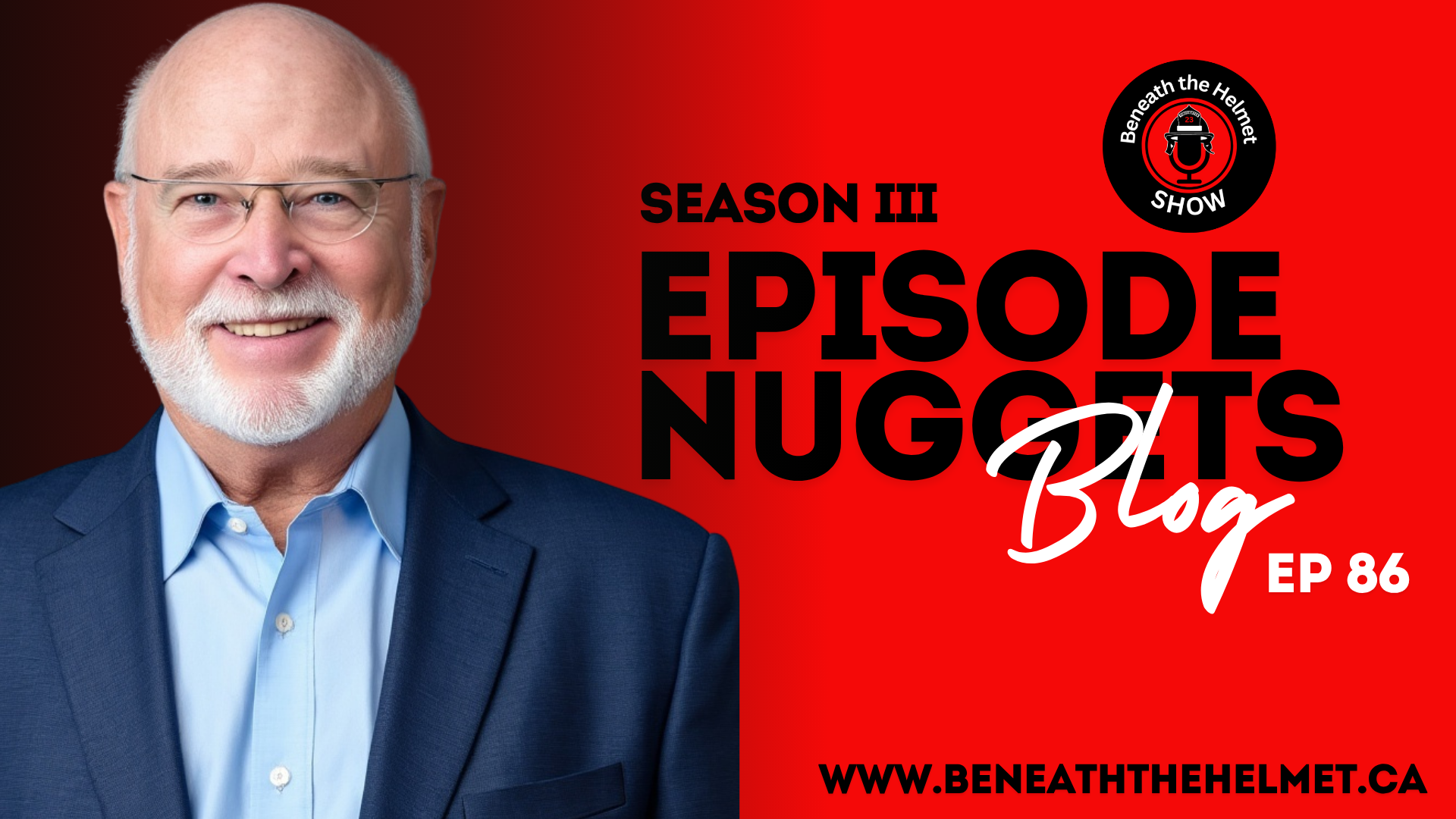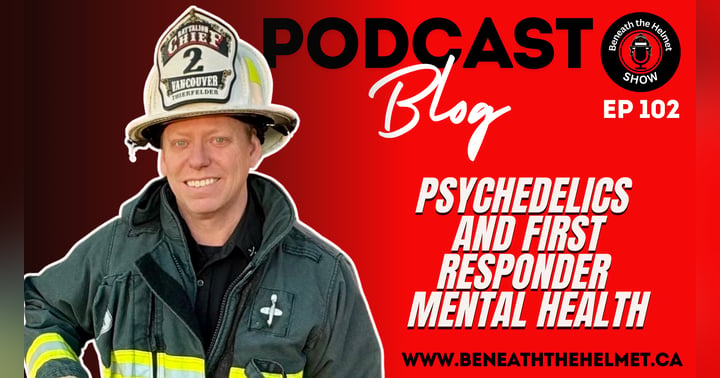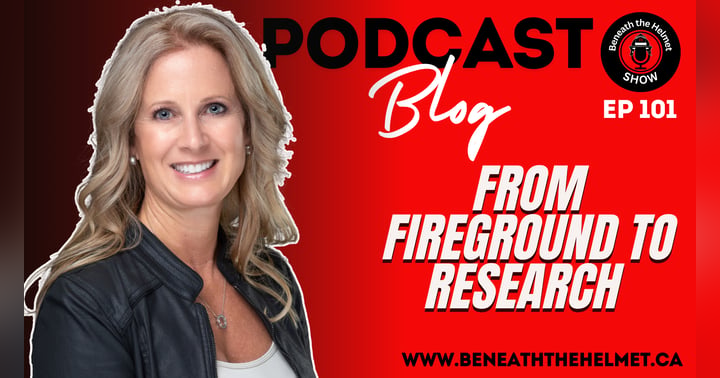From Great to Magnus: Unlocking Competency-Based Leadership for First Responders

What does it take to go from being a “good” leader to becoming a truly Magnus leader?
In this in-depth Beneath the Helmet conversation, I sat down with Dr. Terry Anderson, retired criminologist, author, leadership coach, and lifelong advocate for public safety leadership. Over five decades, Dr. Anderson has trained thousands of firefighters, police officers, corrections staff, and first responders, helping them develop their leadership skills, enhance their mental well-being, and create a lasting impact within their respective organizations.
We explored the power of competency-based leadership, the Great to Magnus movement reshaping public safety leadership, and why “soft” skills like communication and empathy are actually the hardest, and most critical, to master. Dr. Anderson also shared his practices for longevity, resilience, and mental clarity at age 80, proving that outstanding leadership starts with self-leadership.
If you’re a firefighter, officer, EMS professional, or anyone working in public safety, this conversation is packed with tools, hope, and inspiration. Let’s dive in.
Competency-Based Leadership: Why It’s Essential
Dr. Anderson explained that competency-based leadership goes far beyond reading leadership books or memorizing theories. It’s about breaking down leadership behaviours into trainable, measurable skills, skills that build resilient leaders and high-performing teams.
He shared how his early work teaching social workers evolved into decades of teaching public safety professionals, from police recruits to firefighters and corrections officers. His research found that leaders who trained in competency-based leadership:
Built more trust and stronger teams
Reduced stress and improved family relationships
Got promoted twice as often
Experienced better mental wellness on and off the job
Competency-based leadership is about practical mastery—learning and practicing specific skills, such as active listening, problem-solving, and team consensus-building, until they become second nature.
The Five Skillsets of Truly Prepared Leaders
Through decades of training, Dr. Anderson identified five essential skill domains that create fully equipped leaders:
Self-Management Skills – from stress management to personal financial and time management, creating a solid life foundation.
Interpersonal Communication Skills – the ability to truly connect, listen, and empathize with others.
Problem-Solving Skills – approaching challenges strategically and collaboratively.
Team Leadership Skills – inspiring buy-in, building consensus, and creating an empowered team culture.
Organizational & Community Leadership Skills – leading at scale with impact that benefits both the organization and the community it serves.
Leaders who master these five areas can move from “good” to “Magnus”—leaders who elevate everyone around them.
The Great to Magnus Movement
So what is Magnus leadership? Dr. Anderson described it as the next level of leadership, where clarity, resilience, and compassion intersect. It’s about:
Building confidence and competence through measurable skills
Leading with empathy and mental clarity under pressure
Creating a culture of continuous improvement where everyone grows together
Balancing high performance with well-being, ensuring leadership doesn’t come at the cost of personal or family health
The Great to Magnus movement is spreading across public safety sectors, offering a roadmap for leaders who want to leave a legacy of healthy, resilient teams and better community outcomes.
Positive Intelligence & Mental Wellness
Dr. Anderson also introduced positive intelligence, a practice that strengthens the brain’s ability to move from an alarm state (stress, reactivity, fear) to a sage state (calm, empathy, innovation).
In leadership, this means you can:
Respond to challenges with clarity, not reactivity
Reduce chronic stress and burnout
Build mental resilience for yourself and your team
This is especially critical for first responders who work in high-stakes, high-stress environments. Leadership isn’t just about guiding others, it’s about maintaining your own mental health so you can show up at your best.
Longevity, Leadership, and Self-Care
At 80 years old, Dr. Anderson continues to coach leaders, facilitate workshops, and live a purposeful life. His toolkit for leadership longevity includes:
Regular exercise and strength training
A mostly plant-based diet with balanced flexibility
Deep meditation and yoga to move the mind into clarity
Practicing gratitude and presence to enjoy each moment
Staying mentally engaged through coaching and learning
His message is clear: healthy leaders build healthy organizations. Self-leadership is the foundation for everything else.
My Top 5 Nuggets
Here are the five biggest lessons I took from this conversation:
Leadership is a skillset, not just a title. Truly effective leaders practice measurable skills daily, not just leadership theories.
Soft skills are the hardest skills. Communication, empathy, and consensus-building are what make or break leadership, and they require intentional practice.
Mental health and leadership are closely intertwined. You can’t lead others well if you’re constantly in a state of stress or reactivity.
Self-leadership comes first. You can’t build strong teams or healthy organizations if your own life foundation is weak.
Leadership longevity is possible. With intentional habits, exercise, meditation, and clarity, you can stay sharp, compassionate, and impactful well into later life.
Why This Matters for First Responders
Firefighters, police officers, and EMS professionals face unique pressures that can lead to burnout, operational stress injury, and fractured team culture if leadership isn’t strong.
Magnus leadership provides a path forward, a way to build resilient leaders who protect their own mental wellness while creating healthier, more effective teams.
Whether you’re just stepping into leadership or you’re a seasoned officer, these principles can help you lead yourself and others better.
Listen & Subscribe
If you’re ready to strengthen your leadership, improve your mental wellness, and help create a healthier culture in public safety, this episode is a must-listen.
🎧 Listen now to Beneath the Helmet: From Great to Magnus with Dr. Terry Anderson.
👉 Subscribe to Beneath the Helmet for more powerful conversations on firefighter resilience, leadership development, and mental wellness for first responders.
Let’s build leaders who elevate others, protect their own health, and leave a lasting impact on their teams and communities.












